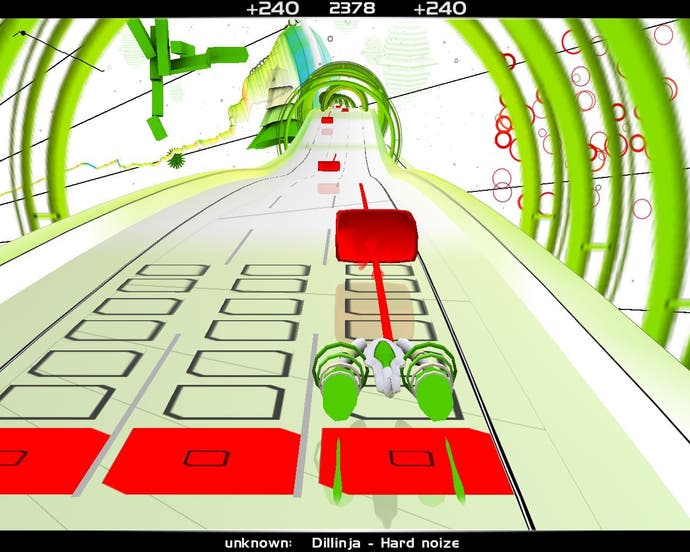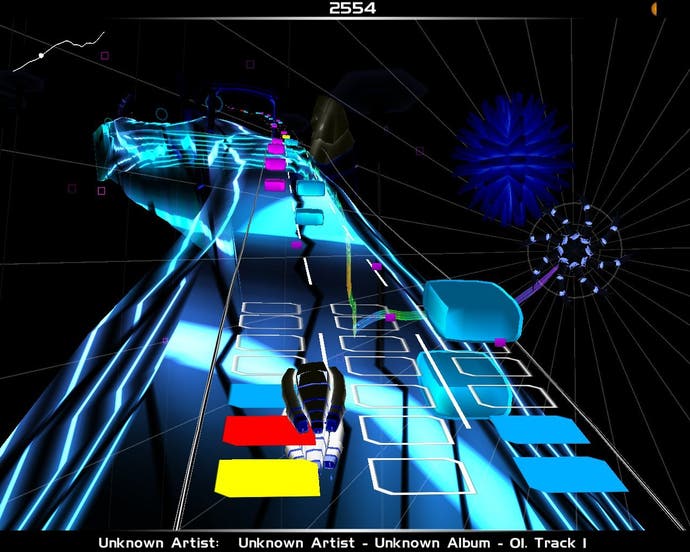Audiosurf
IGF 2008 Finalists: Invisible handlebar.
Yesterday we began our series of IGF previews with a little look at the excellent World of Goo; today we're examining its fellow Seumas McNally Grand Prize nominee Audiosurf.
One of the more esoteric entries to the IGF, Audiosurf was created with the intention of combining music visualisers with fast-paced gameplay. It's the kind of collision of concepts that we've seen in various forms over the years, but it's never been done quite like this. What's perhaps most striking about the game is that it's so straightforward to get into: load up whatever MP3 you want from your PC and jump right in. You're presented with a little ship racing down an undulating track - a track that moves in time with the music. Once in flight, you take control with the mouse and keyboard and find yourself playing along to the music, your music. It's immediately obvious what you have to do, even without the excellent tutorial. As you zoom you collect coloured blocks, again in time with the beats. Collect groups of three similar colours for high score. It's not-quite-rhythm-action and it's fantastically accessible.
It's also one of those games that can either be a slouched chill-out experience or an eye-gouging challenge. While the visuals do have that space-room-projector feel to them, there's nevertheless a fast and tricky game here. Developer Dylan Fitterer has talked about how his work was heavily inspired by SEGA's psychedelic rail-shooter Rez, and you can see it in how Audiosurf's sound and visuals come together. It's an altogether different gaming experience, however, since despite the rail-shooter appearance it's actually something rather more like a high-speed puzzler. Racking up sets of the right kind of colour can become compelling, even borderline frustrating, as you surge relentlessly along the musical puzzle-hybrid of your choosing. If there's a distinct problem I'd say it's how the important puzzle elements sit in your visual field. I found myself losing track of what I had collected at the bottom of the screen because I was so preoccupied with watching what was coming next along the course. Managing these two things is a skill that will take a bit of practice if you're not going to languish in low-score land.

Nevertheless while zipping along the tracks (with that double meaning in tow) you find yourself gathering a kind of inertia: an ongoing gameplay momentum. Audiosurf has that vaguely hypnotic puzzle-rhythm that you get in games like Tetris or Bejewelled. It's not that Audiosurf is quite as mind-lockingly compulsive as these games, but you do play to the soundtrack of your choice, and that's a pretty big factor in the overall experience. Add to this a bunch of extra gameplay options, such as different "characters" that can be selected to change your on-track abilities (moving blocks around in your path, and so on) and you've got a healthily-sized slice of game.
Of course what's most interesting about Audiosurf as a piece of design is the music processing system that turns your MP3 into the game track. The program analyses the track before you play, creating the pacing and the gameplay space that you're going to be surfing through. This means that as the music peaks, so do the visuals that surround your game. If you're in a particularly intense section, then the chances are that the music will be rising as you play. When the music hammers home its major releases, so the neon track scintillates around you. As you'll see when you have a play of Audiosurf (because I'm sure every gamer and his roadie will want to take a look at this), it's a deeply impressive effect, especially when the program takes just a few seconds to figure out how to deliver your MP3 back to you in audio-visual gameplay form.

So yes, Audiosurf's core concept is a remarkable trick, and one of those things that games do that seems vaguely magical to my stone-age understanding. What's most important, of course, is that because this system allows the game to process any MP3, you're going to be playing it with a soundtrack defined entirely by you. I played Audiosurf across a range of genres, from warbly ambient weird through to the most twitchy math rock, and the shape of the song altered the experience remarkably. It's hardly surprising: any game that allows you to import your own tunes ends up taking on some thematic character of whatever you're listening to. For maximum incongruence I recommend playing some absurd jazz and following it up with the heaviest beats you can lay your hands on. (And in the game.)
Ultimately it's an intriguing piece of design that, after being honed over a long period by a single inspired designer, has now entered a mature phase in which I'd expect to see a much wider audience taking notice of it. He's had a little help polishing it up, and the interface is brilliant, suggesting that it might just get sucked up by one of the console online services, or find itself a niche as a commercial entity. But I still can't see it winning the grand IGF Award, for one simple reason: it's too easy to become frustrated with the most basic system of picking up blocks. I suspect the sheer pace of Audiosurf might well be too much for some, especially over a busy or sustained track. Ten minutes of Squarepusher and my brain had begun to collapse in on itself. Unlike other IGF final candidates, this isn't going to be a game that utterly consumes your leisure time. And I think that alone will be the deciding factor.
Check out Audiosurf's website for more details.


